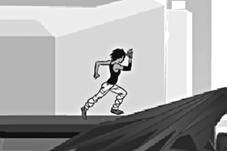题目内容
阅读下面短文,掌握其大意,然后从下列各题所给的四个选项(A、B、C和D)中,选出可以填入空白处的最佳选项,并在答题卡上将该项涂黑。
Strange things happen to time when you travel. __11___the earth is divided into24 time zones, one hour apart, you can have days with __12___ or fewer than 24 hours, and weeks with more or fewer than seven days.
If you __13___ a five-day trip across the Atlantic Ocean, your __14___ enters a different time zone every __15___. As you enter each zone, the time __16___ one hour. Traveling west, you set your clock back; traveling east, you set it __17___. Each day of your trip has __18___ 25 or 23 hours.
If you travel by ship across the Pacific, you ___19___ the internationaldate line. By agreement, this is the point __20___ a new day begins. __21___ you cross the line, you change your __22___ one full day, backward __23____ forward. Traveling east, today __24___ yesterday; traveling west, __25___ is tomorrow!
小题1:
小题2:
小题3:
小题4:
小题5:
小题6:
小题7:
小题8:
小题9:
小题10:
小题11:
小题12:
小题13:
小题14:
小题15:
Strange things happen to time when you travel. __11___the earth is divided into24 time zones, one hour apart, you can have days with __12___ or fewer than 24 hours, and weeks with more or fewer than seven days.
If you __13___ a five-day trip across the Atlantic Ocean, your __14___ enters a different time zone every __15___. As you enter each zone, the time __16___ one hour. Traveling west, you set your clock back; traveling east, you set it __17___. Each day of your trip has __18___ 25 or 23 hours.
If you travel by ship across the Pacific, you ___19___ the internationaldate line. By agreement, this is the point __20___ a new day begins. __21___ you cross the line, you change your __22___ one full day, backward __23____ forward. Traveling east, today __24___ yesterday; traveling west, __25___ is tomorrow!
小题1:
| A.Because | B.If | C.Although | D.When |
| A.much | B.more | C.many | D.less |
| A.do | B.make | C.go | D.travel |
| A.plane | B.train | C.car | D.ship |
| A.day | B.night | C.hour | D.time |
| A.goes | B.changes | C.shows | D.adds |
| A.ahead | B.upward | C.backward | D.fast |
| A.neither | B.either | C.both | D.nor |
| A.travel | B.trip | C.cover | D.cross |
| A.which | B.what | C.that | D.where |
| A.When | B.Where | C.While | D.Before |
| A.time | B.calendar | C.date | D.hour |
| A.and | B.or | C.but | D.still |
| A.changes | B.makes | C.becomes | D.goes |
| A.which | B.this | C.that | D.it |
小题1:A 小题1:B 小题1:B 小题1:D 小题1:A 小题1:B
小题1:A 小题1:B 小题1:D 小题1:D 小题1:A 小题1: B
小题1:B 小题1:C 小题1:D
略

练习册系列答案
相关题目
 nstead of 37 , he sat next to my side and placed the flower to his nose and 38 loudly with certainty, "It sure smells pretty and it must be beautiful, too. That's why I picked it; here, it's for you." The weed before me was dying or dead, not vibrant of 39 , orange, yellow or red. But I knew I must take it, or he might never leave. So I 40 for the flower, and replied, "Just what I need." Again, 41 placing the flower in my hand, he held it mid-air without reason or plan. It was then 42 I noticed for the very first time that the boy could not see: he was 43 .
nstead of 37 , he sat next to my side and placed the flower to his nose and 38 loudly with certainty, "It sure smells pretty and it must be beautiful, too. That's why I picked it; here, it's for you." The weed before me was dying or dead, not vibrant of 39 , orange, yellow or red. But I knew I must take it, or he might never leave. So I 40 for the flower, and replied, "Just what I need." Again, 41 placing the flower in my hand, he held it mid-air without reason or plan. It was then 42 I noticed for the very first time that the boy could not see: he was 43 .  making
making “Our aim is to take our art to the world and make people understand what it is to move,” said David Belle, the founder of parkour(跑酷).
“Our aim is to take our art to the world and make people understand what it is to move,” said David Belle, the founder of parkour(跑酷). sworthy and his helpers roll their snowballs into place at mid-night?
sworthy and his helpers roll their snowballs into place at mid-night? y don’t reach them, they use QQ, e-mails, and text messaging to get the words out.
y don’t reach them, they use QQ, e-mails, and text messaging to get the words out. hen planning to get together with friends”, Julian said, “the easiest and fastest way I know is to send a text message to my contact group.”Jocelyn said. “If I want to go to see a movie with a few friends, I usually send text message to them. By telephone, you have to call every single friend one by one. But text messaging allows you to send the same message to as many as you’d like, which saves a lot of time. ”
hen planning to get together with friends”, Julian said, “the easiest and fastest way I know is to send a text message to my contact group.”Jocelyn said. “If I want to go to see a movie with a few friends, I usually send text message to them. By telephone, you have to call every single friend one by one. But text messaging allows you to send the same message to as many as you’d like, which saves a lot of time. ” rt “get the words out” means“ ”.
rt “get the words out” means“ ”.